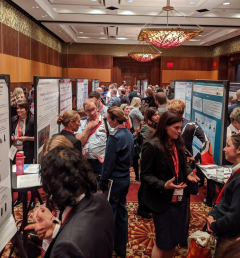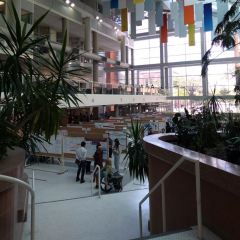Depending on how you feel about discussing your research and networking with professionals in your field, scientific conferences can be exciting or intimidating experiences. Personally, I enjoy conferences. They are always full of energy, opportunities for learning, and a good time to take account of everything I’ve accomplished in the previous months. But like everything else, you get out of a conference what you put into it. You can just go to present your work and get it over with, or you can prepare and make the conference an enriching experience. Here are five tips, or five things to do, to help you rock your first (or nth) conference.
Before you go:
1 – Prepare your finances
Attending conferences can be expensive. Conference fees can figure into the hundreds of dollars. If the conference is outside of your city, you’ll have to plan for transportation, accommodations, meals and incidentals (I always forget my phone charger). Thankfully, there are a few ways to get help funding your travels. Most graduate student associations have funds or grants to support their students. It is good to apply for this funding as soon as you know you’ll need it since these grants are often distributed on a first-come first-served basis. Additionally, it can take a few weeks for the graduate student association to process your funding request. The Carleton University Graduate Student Association travel grant information can be followed through the following link: https://gsacarleton.ca/travel-grant/
You can also discuss funding for scientific conferences with your program supervisor or departmental administrators. There may be additional funding opportunities at your university and your supervisor may have some funding available to support your travels. Experiencing a scientific conference is an important part of your professional and academic development after all!
2 – Prepare to introduce yourself
Conferences are exciting since they gather scientists and stakeholders from many different institutions into one location. At my first conference, this was the thing I found most intimidating. I was surrounded by legitimate professionals. I didn’t have a problem presenting my research, but I seized up when networking. This task became much easier after practicing my networking skills. There are tons of online resources for successful networking but the first thing to do is to prepare to introduce yourself… a lot.
You will be spending a few days with professionals in your field, some of which you planned to meet, and some others who have planned to meet you! First impressions are very important, so prepare how you will introduce yourself. Go beyond your name and job title. Try to add information about what it is you are good at, what it is you like, how you contributed to the project, and what you want to be remembered for. Make this information flow and feel natural and try to deliver it in 15-20 seconds. Being succinct will let you expand on these points in your conversations afterwards! Prepare a few different introductions, some for people you really want to meet, and some for people you will just speak to in passing. Once you have your introductions drafted, practice them with your colleagues or lab mates. They can give you some honest feedback or you can identify opportunities for improvement when you say them out loud to another human! Finally, consider making business cards with your phone, email, website, Twitter, Instagram, Facebook, Google Scholar, ORCID accounts. It may seem old school, but people ask me for business cards all the time – even when my info is plastered all over my presentation slides or poster.
https://ideas.ted.com/how-to-introduce-yourself-so-youll-be-unforgettable-in-a-good-way/
3 – Prepare your conference itinerary
Presenting your work may seem like the “main event” of the conference, but there is so much more happening. It takes a plan to make sure you hit all the presentations or booths that are relevant to your work or other scientific interests. Look at the conference itinerary, abstracts, guest lists and workshops. Highlight the events you plan to attend, the rooms you will be visiting and the people you want to meet. Make sure to sign up for the workshops you plan to attend as well – signing up is often mandatory and can even require entry fees. You can often get all this information online or by contacting the conference coordinators. Planning ahead and making the most of your time can really make for a satisfying experience, especially if your networking leads to some breakthroughs in your research!
http://hellophd.com/2018/07/097-conference-like-the-pros-how-to-plan-network-and-win/
WHILE YOU’RE THERE
4 – Take lots of notes
The biggest lie I tell myself is “I’ll remember this later”. I tell myself “there is no way I’ll forget this!”. But sure enough, I forget the thing. All the time. You will too. So, take some notes! Take a lot of notes, about everything either in a stylish notebook or on your tablet or on your phone (although some people may give you looks if you’re taking notes on your phone when you’re talking to them). Note down what talks you attended, who delivered the talks and the take-home messages. Ask if you can take pictures of their posters or slides, too! Write down who you met and spoke with, note their coordinates, take their business cards, and note down one personal thing about the person you can bring up later. Keeping this detailed record of the conference will help you remember important information and people months later. It will help you process your experience and relay it back to your lab / colleagues. Written notes will also help you keep in touch with your connections and act on the information you’ve gathered in the following months.
ONCE YOU’RE BACK
5 – Revise your notes
Once the conference is done and your sleep schedule is back to normal (at least as normal as possible for a grad student), you may feel ready to revise your notes and revisit your conference experience. I like to keep a folder on my laptop for every conference I attend. I transcribe and organize my notes, pictures, and contact information for people I’ve met. Revisiting your notes and experiences after resting can give you a new perspective on the things you’ve experienced, as well as new ideas for work or collaborations. You may want to send some emails to keep up with your contacts, to keep your network active. Email these people and wish them well in their research or update them on your work every now and again (6-month intervals are usually a safe bet). I’ve made many conference buddies over the years. We talk rarely but we get excited to see each other’s work every year. Remember, the best way to make a friend is to be a friend!
Conclusion
Conferences are fun events where researchers celebrate their achievements, but they are also a lot of work. Preparing for a conference beforehand and acting on the information you’ve gathered will make the experience much more valuable to your work and to the work of the researchers in your network. These events are meant to get like-minded people together to discuss everything that’s been done recently and find news avenues of research. If every attendee walks away with at least one good new idea, imagine everything that can be accomplished for when the next conference comes around! Hopefully this information will help you prepare for your next scientific conference and really make the most of your time there.
By: Daniel Cousineau-Short

